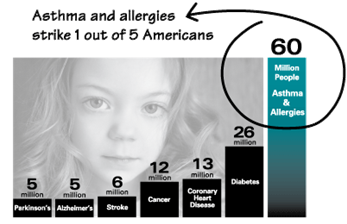* Annual U.S. Prevalence Statistics for Chronic Diseases

So, exactly what are allergies? There's a lot of information on this subject to share with you. So, we will break it into bite size pieces over the course of the month. Let's start with the basics, the formal definition and go from there.
Definition of Allergy
al·ler·gy
definition courtesy of dictionary.com
[al-er-jee]
noun, plural al·ler·gies.
- an abnormal reaction of the body to a previously encountered allergen introduced by inhalation, ingestion, injection, or skin contact, often manifested by itchy eyes, runny nose, wheezing, skin rash, or diarrhea.
- hypersensitivity to the reintroduction of an allergen. Compare anaphylaxis.
- Informal . a strong dislike or aversion, as toward a person or activity: He has an allergy to hard work.
Allergies indicate an overreaction of the immune system to substances that usually that usually have no effect on other individuals. Allergies are commonly grouped by the kind of stimuli, time of year or where symptoms appear on the body, such as indoor, outdoor, food, latex, insect, skin and eye. These substances can trigger sneezing, wheezing, coughing and itching. While allergies are somewhat bothersome, they can often be linked to a many other common, and sometimes, serious chronic respiratory illnesses (such as sinusitis and asthma).
Seasonal Allergies or Year Round?
Some allergies are considered more “seasonal” while others are on-going and can bring misery to the sufferer all year round. “Seasonal” allergies (also called “seasonal allergic rhinitis” [SAR], “hay fever,” or “nasal” allergies) occur when allergens that are commonly found outdoors are inhaled into the nose and the lungs causing allergic reactions. Examples of commonly inhaled outdoor allergens are tree, grass and weed pollen and mold spores. The allergic reaction to all plants that produce pollen is commonly known as hay fever.
Symptoms include eye irritation, runny nose, stuffy nose, puffy eyes, sneezing, and inflamed, itchy nose and throat. For those suffering severe allergies, asthma attacks, chronic sinusitis, headaches and impaired sleep are symptoms. Warm weather also brings some not-so-welcome visitors in the form of stinging insects. For most people, these small creatures are an annoyance that threaten to ruin outdoor fun, but for some 2 million Americans, these insects pose a far more serious threat of a life-threatening allergic reaction. Other allergens existing outdoors are poisonous plants, and these, as well as insects, are considered “contact,” “skin” or “insect” allergens rather than “inhaled” allergens.
Year round allergies include indoor allergies (“perennial allergic rhinitis” [PAR], often called “nasal” allergies). These occur when allergens that are commonly found indoors are inhaled into the nose and the lungs causing allergic reactions. Examples of indoor allergens are airborne cat or dog dander, dust mite feces and mold spores. Other year round allergies are food allergies and allergic reactions to certain drugs. They are characterized by a broad range of allergic reactions to ingredients in the foods we eat or the medications we take. Food allergy is an overreaction of the immune system, different than food intolerance or food sensitivity. The U.S. Food Allergy Labeling Consumer Protection Act (FALCPA) now requires food labels to clearly identify all allergen ingredients (even if it's a spice or flavoring), and to discourage labels with ‘may contain' statements.
Natural Herbal Remedies
While many people find relief with over-the-counter medications and nasal sprays, there's a growing number of people concerned about the side effects of these treatment options, and are looking for more natural sinus allergy remedies. There are several important herbs that naturally provide sinus allergy relief. click here for more info.
In Health,
Naturally Botanicals Team
www.naturallybotanicals.com


There are many types of medications for allergies, but a great help is certainly natural medicine.
ReplyDelete